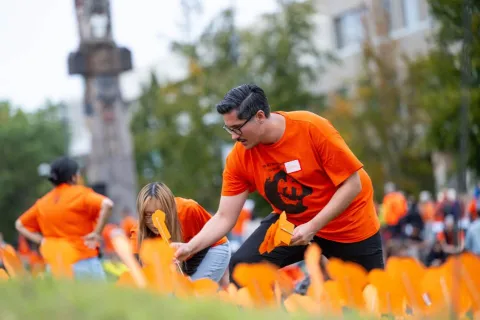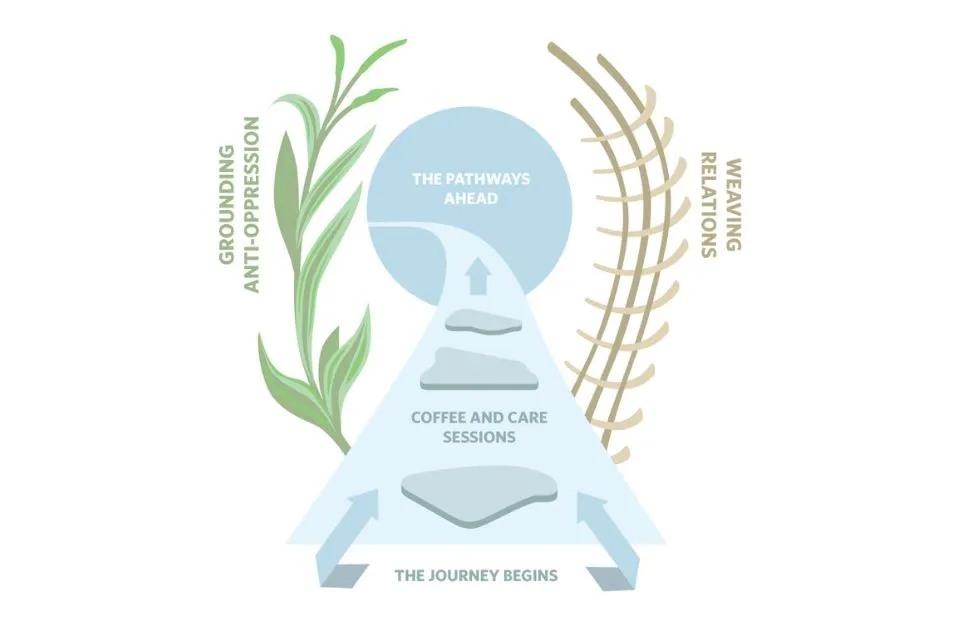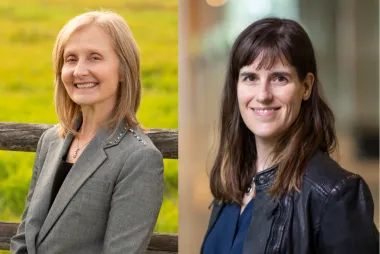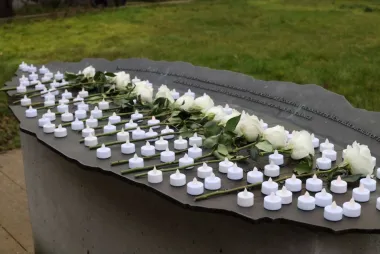New, self-paced training on anti-oppression and Indigeneity available to UBC faculty, staff

When Dana-Lyn Mackenzie presents on equity and inclusion in her role as Senior Manager of EDI and Indigeneity, she notices a couple of recurring issues.
“We spend a lot of time going over basic concepts like power and privilege, and less time on the topic at hand,” said Mackenzie, who is cross-appointed among the Faculties of Applied Science, Land and Food Systems, and Forestry.
“We realized we need a way to get everyone on the same page.”
Many current EDI offerings require cohorts to commit to specific times, which presents an additional barrier for faculty and staff who may not be able to adapt their busy schedules accordingly.
In light of these challenges, Mackenzie designed a new training program, Cascades of Change to Inclusive Leadership and Respectful Engagement, for all UBC faculty and staff to take at their own pace.
“Cascades of Change offers a flexible opportunity for any UBC faculty and staff member to build into their professional development goals, and receive formal recognition for where they are in their commitment to EDI.I,” said Dr. Agnes d’Entremont, Associate Dean of Equity, Diversity and Inclusion pro tem, Faculty of Applied Science.
The Cascades of Change program guides learners through two foundational streams, one focused on Indigeneity and the other on anti-oppression more broadly. Each stream involves a three-part process: a self-paced Canvas course, followed by a variety of experiential learning opportunities participants can choose from and workshops, as well as “coffee and care” gatherings where they can meet fellow learners and colleagues.
Participants can go through the program at their own pace with no strict cohorts or time deadlines to get in the way of learning. Those who complete both streams—including 12 hours of Canvas course learning and 25 hours of hands-on learning—will receive the Cascades of Change certificate of completion.

Professional development through asynchronous learning
Weaving Relations, the first self-paced Canvas course to kickstart the Indigeneity stream, explores Indigenous histories, people and contexts, as well as settler colonialism in Canada. Since its initial launch last summer, it has seen new registrants almost every day of the year.
Jennifer Pelletier, Senior Manager, Administration in the Department of Mechanical Engineering, said of the course: “Weaving Relations strikes a careful balance between introductory information and providing depth, while creating a compelling story and narrative you are enticed to continue viewing.
“As someone who went though the Canadian school system and has engaged with our history from both Indigenous and colonial sources, I was initially hesitant about another online course—but this one challenged assumptions, provided new information and perspectives, and was a worthwhile undertaking. I recommend it to all my colleagues.”
The second stream in Cascades of Change begins with Grounding Anti-Oppression, a Canvas course which explores EDI.I and anti-oppression work in workplace settings, particularly within universities. The course aims to provide a foundation on concepts like how systems of power manifest at individual, interpersonal and institutional levels.
“Once you do this course, you’re more comfortable raising these issues or bringing them up into your classroom,” said Ranjit K. Dhari, Associate Professor of Teaching at the School of Nursing. “It becomes easier to talk about.”
Dhari found the course material so valuable that she recommended to the School of Nursing’s Anti-Racism Committee to adapt the coursework to nursing, and make a mandatory requirement for nurse practice educators.
From passive learning to active engagement and connection
The second part within each stream involves learning through experience, in the form of two workshops and two experiential learning opportunities, such as attending the Intergenerational March to Commemorate Orange Shirt Day or the 14 Not Forgotten ceremony, followed by reflective journaling.
“The experiential learning step takes you from being a more passive participant to an active one,” said Mackenzie. “Reflective journaling is a key component for each of these experiences to help learners consider what they are taking in and what they want to carry with them in their ongoing journey.”
Cascades of Change includes an invitation to attend at least three community Coffee and Care sessions, which take place every other month, for participants to connect with fellow learners and colleagues. These gatherings offer an opportunity for colleagues to share and reflect on their learnings together in a supportive environment.
“One can only go so far on one’s learning journey toward the necessary work of decolonization in isolation,” said Tamara Ross, Associate Director, Administration and Academic Operations, School of Architecture and Landscape Architecture. “Once you have discovered the truth, the only way forward is with community. A community of others committed to unlearning, relearning and taking action together.”
An opportunity for lifelong learning
Cascades of Change offers more than just a foundational professional development opportunity, explains Mackenzie. “This is the first step in an ongoing journey to better understand one another.
“In our world today, you see how polarized public opinion can be. With public affairs—and by extension, public institutions—it is easy to vilify people. I hope this program reminds people that we are all here together, and that we need to work from the heart and connect with each other.”
Cascades of Change to Inclusive Leadership and Respectful Engagement





